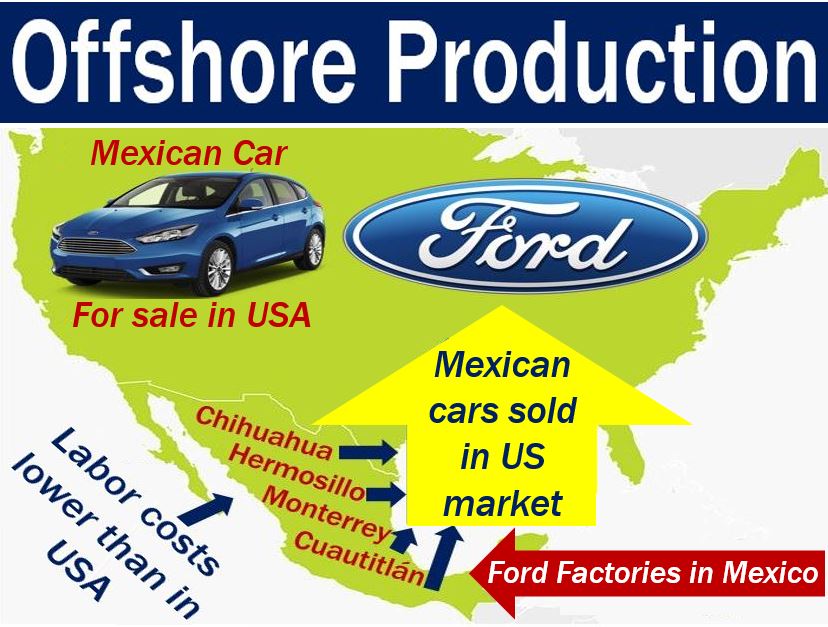Offshore production is the manufacturing of a product in another country for import to the home market. The term may also apply to the assembly of goods abroad, which the company then imports and sells to the home market.
Businesses typically relocate their production abroad because labor costs in the other country are cheap. Sometimes, companies are motivated by raw material costs. In other words, the raw materials cost less in the other country.
Offshore production is one of the examples of ‘offshoring.’ Offshoring is the relocation overseas of any part of the business process.
In most cases, businesses relocate an operational process, such as manufacturing or assembly. They may also relocate supporting processes abroad, such as accounting.
Moving production to others countries is part of a process we call globalization.
Offshore production – oil and gas industry
In the oil and gas industry, offshore production is the extraction of oil and gas from oil fields and natural gas deposits under the sea.
Companies use oil rigs for the offshore exploration and production of crude oil.
We get at crude oil deposits in the ocean using oil rigs. We then replace the drilling platforms with production platforms.

What is and isn’t offshore production
Offshore production, which we also call offshore manufacturing, involves relocating the production process abroad. For example, German car manufacturer BMW may relocate the assembly or production of vehicles to eastern Europe.
However, if BMW opens a factory abroad for that local market, we do not perceive that as offshore production. For example, BMW has production facilities in the United States.
The cars BMW makes in the US are manly for American consumers to buy. They are not for the domestic German market. Therefore, BMW’s US factories are not examples of offshore production.
Most US and European multinational pharmaceutical companies have production facilities in China. Those factories make drugs that Chinese consumers buy and use. Therefore, in the opinion of most people, those pharmaceutical companies do not participate in offshore production in China.
However, some US automakers have factories in Mexico. Ford Motor Company, for example, has plants in Chihuahua, Hermosillo, Monterrey, and Cuautitlán – all in Mexico.
Ford sells a significant proportion of its Mexican cars to US consumers. Therefore, Ford participates in offshore production in Mexico.
Definition of ‘offshore’
In business and finance, the term ‘offshore‘ means ‘abroad‘ or ‘operating in a foreign country.’ However, like the word ‘overseas,’ the term is misleading. It does not necessarily mean the other country is across the sea.
For example, to get from the US to Mexico, you do not need to cross the sea. However, any US company with factories in Mexico that make goods for sale in the US participates in offshore production.
Offshore financial centers, which exist in many tax havens, offer services to people and companies from other countries.
If you register a company in, for example, Bermuda, but it operates mainly in the US, it is an offshore company.
We call a fund that operates in another country an offshore fund. Offshore funds typically exist in tax havens.
An offshore trust is a trust that exists outside the trustor’s country of residence.
‘Offshoring’ is a general term for any relocation of a company’s business activity abroad.
